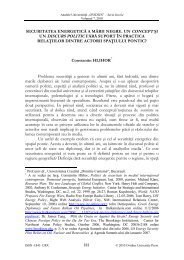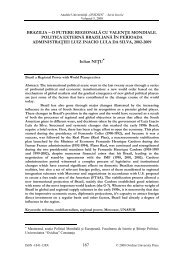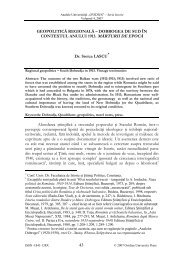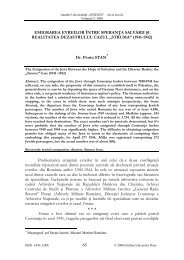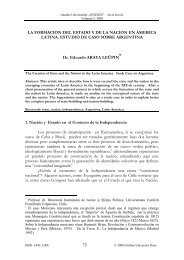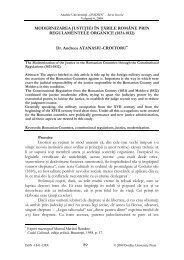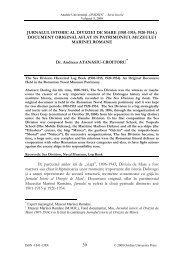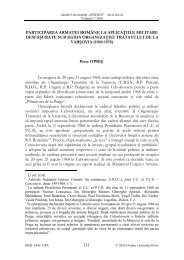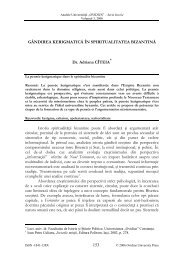analele universitÄÅ£ii âovidiusâ constanÅ£a - AUOCSI
analele universitÄÅ£ii âovidiusâ constanÅ£a - AUOCSI
analele universitÄÅ£ii âovidiusâ constanÅ£a - AUOCSI
You also want an ePaper? Increase the reach of your titles
YUMPU automatically turns print PDFs into web optimized ePapers that Google loves.
Luiza Filimon / Analele Universităţii „OVIDIUS” / Vol. 6/ 2009<br />
In order to exemplify this, we shall look upon the process of police<br />
reform in Serbia. It has registered numerous positive developments, i.e.: the<br />
implementation of the fight against organized crime (formal and practice), the<br />
Multi-Ethnic Project and the Community Policing Project; the successful<br />
process of de-militarization (it is expected that only the ranks will be abrogated);<br />
the number of female police officers has rapidly increased and is still on the rise;<br />
numerous trainings and courses (aimed to train and specialize officers about<br />
specific knowledge) have been organized; the public information program has<br />
been improved and adapted to the citizens’ needs; the police is better equipped<br />
than before with a tendency toward further amelioration. Unfortunately, we can<br />
also identify drawbacks and concerns. The legislation process still is in its very<br />
beginning; almost nothing of great importance has been achieved (the<br />
Organized Crime Law is full of shortcomings, the Criminal Procedure Law has<br />
been modified continuously without success); the systems of internal and<br />
external control of police (as it is anticipated in the Draft Police Law) do not<br />
function properly 9 .<br />
In a strategy paper commissioned for the conference “The Search for<br />
Stability in the Balkans,” which took place in Vienna in April 2006, Drs. Iris<br />
Kempe and Kurt Klotzle, from the Bertelsmann Group for Policy Research and<br />
Analysis, argued that the Balkans region is characterized by numerous common<br />
hazards and provocations, including fragile statehood, a shared history of<br />
violent conflict, unconsolidated democratization and economic<br />
underdevelopment. Given the acute geopolitical position of the region as direct<br />
neighbor to the EU, and NATO, instability here can have significant<br />
ramifications for domestic, regional, and international security. Therefore<br />
external actors have developed different policies for this region 10 .<br />
The Western Balkans are on a path toward European integration, even<br />
though the plan and timetable are still quite elusive. The European Union has<br />
introduced the European Neighborhood Policy as a means to prevent new<br />
dividing lines within Europe; the policy is directed toward all non-candidate<br />
countries in the Black Sea, although its scope is primarily bilateral rather than<br />
regional in nature. Russia, has yet to develop an attractive policy to advocate<br />
cooperation in its immediate neighborhood, while it pursues a strategy that<br />
combines personalized networks and economic pressure 11 .<br />
9 Dragan Paunovic, Police Reform in Serbia, at Academic Network South East Europe, p.86,<br />
accessed: November, 20, 2009, at: http://www.akademischesnetzwerk-soe.net/.../Polizei-<br />
Workshop_Protokoll_21-7-04.pdf.<br />
10 Iris Kempe, Kurt Klotzle, The Balkans and the Black Sea Region: Problems, Potentials,<br />
and Policy Options, Bertelsmann Group for Policy Research, CAP Policy Analysis, p.4,<br />
accessed: November, 21, 2009, at: http://www.harvardbssp.org/static/files/314/balkans_Black%20Sea.pdf.<br />
11 Democratization and Security in Central and Eastern Europe and the Post-Soviet States<br />
Conference, October 2009, Panel III: Democracy and Security in the Western Balkans,<br />
ISSN -1841-138X 80 © 2009 Ovidius University Press




